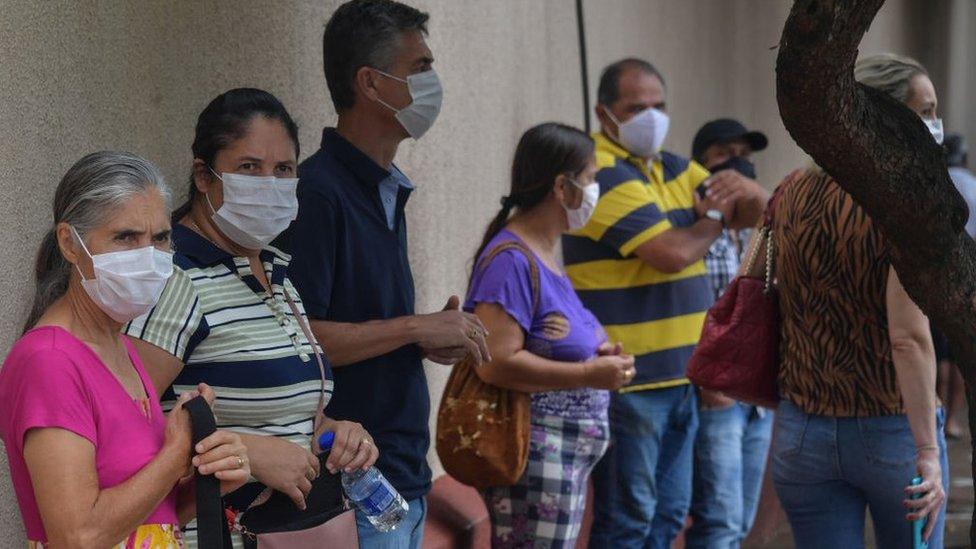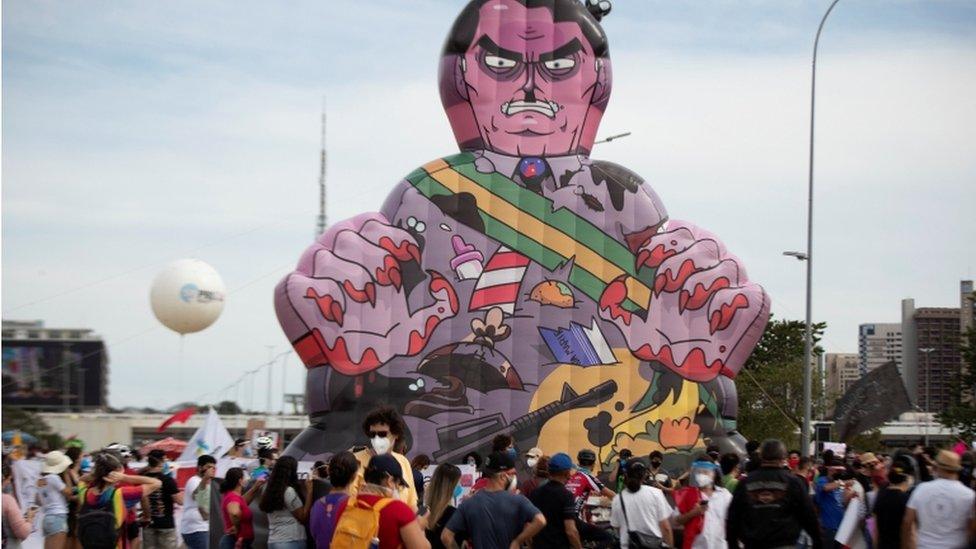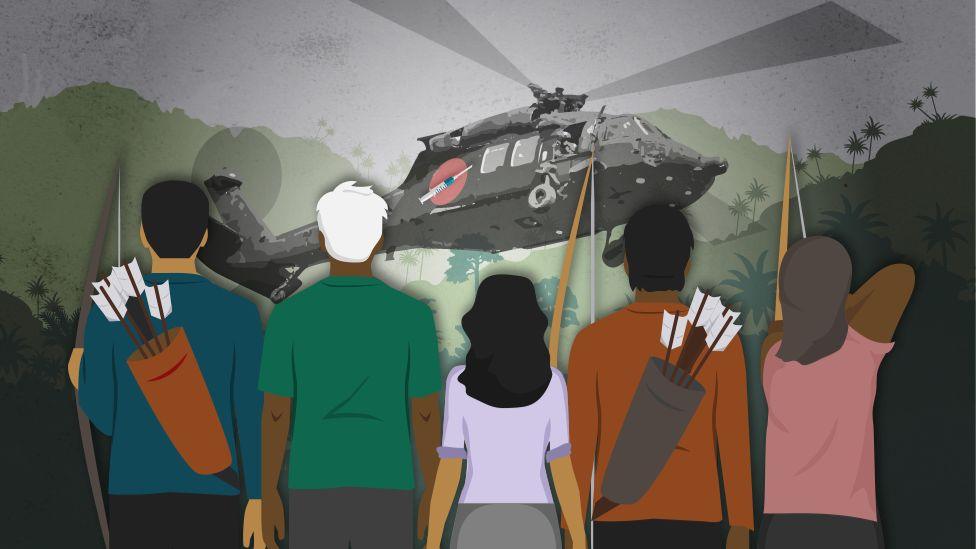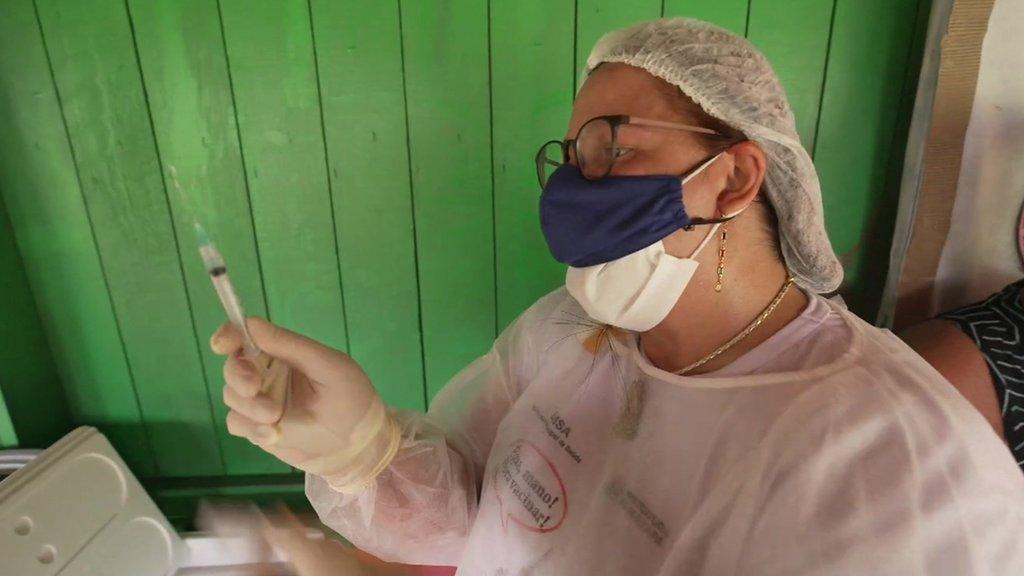Brazil Covid: Deaths plunge after town's adults vaccinated
- Published
In February the BBC looked at how the whole town of Serrana would be vaccinated
A Brazilian town has seen a 95% drop in Covid-19 deaths after almost all adults were vaccinated as part of an experiment, researchers say.
Serrana, with 45,000 inhabitants, saw cases plunge after a mass vaccination with the Chinese-developed CoronaVac.
The team said those who had not been vaccinated were also protected by the reduction in the virus's circulation.
The findings suggest the pandemic can be controlled after 75% of people are fully dosed.
Brazil has been hit hard by the pandemic, with nearly 463,000 deaths.
The country is struggling with a slow vaccination campaign due to insufficient jabs, while the average of daily deaths and cases remains high amid a lack of co-ordinated measures to curb infections.
The experiment in Serrana, in the south-eastern São Paulo state, was carried out between February and April by Instituto Butantan, which produces the CoronaVac vaccine developed by China's Sinovac Biotech.
The city was divided into four areas to help determine the threshold for containing the virus. The team said this was achieved after three areas, or about 75% of the population over the age of 18, had been given both doses.
When 95% of adults were fully vaccinated, they said the results showed that:
Deaths fell by 95%
Hospitalisations fell by 86%
Symptomatic cases fell by 80%
Ricardo Palacios, research director at Butantan, said the key figure was the 75%.
"The most important result is that we can control the pandemic without having to vaccinate the whole population," he said.
Mr Palacios also said there was a decline in the number of cases among children and teenagers, who had not been vaccinated. This could indicate that there was no need to vaccinate children for schools to reopen, he said.

Researchers say they controlled the spread of the virus after vaccinating 75% of the adult population
According to Mr Palacios, the vaccine was also effective against the variant originally known as P.1, and now called Gamma, that was first identified in the northern city of Manaus and has been blamed for a surge in cases across the country.
Serrana, some 315km (195 miles) from São Paulo, is surrounded by cities that are grappling with a spike in infections. A lockdown is in place in Ribeirão Preto, located 24km away with a population of 710,000.
The results of the experiment could give a boost to the CoronaVac, which is being used by dozens of developing countries. There was some controversy about the vaccine this year, after clinical trials in Brazil, Indonesia and Turkey put its efficacy in a range of 50% to 90%.
The CoronaVac is an inactivated vaccine, and works by using killed viral particles to expose the body's immune system to the virus without risking a serious disease response.
The experiment in Serrana was the first of its kind in the world, its authors said. There were no reports of severe side effects from the vaccine and no Covid-related deaths among those who had been vaccinated 14 days after the second shot was applied, the results showed.
A similar study is being carried out in another Brazilian city, Botucatu, which has a population of 148,000. Researchers are using the Oxford/AstraZeneca vaccine, produced locally by the Fiocruz institute.
Brazil has the second-highest Covid death toll in the world after the US, and the third-highest number of cases, at more than 16.5 million. The Brazilian Senate is holding an inquiry into President Jair Bolsonaro's handling of the pandemic and the slow roll-out of the vaccine programme.
Related topics
- Published29 May 2021

- Published8 May 2021

- Published3 May 2021
